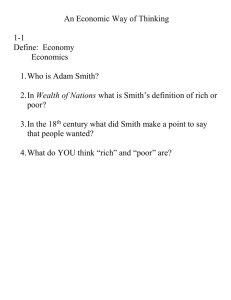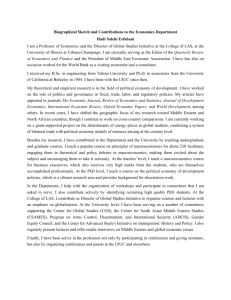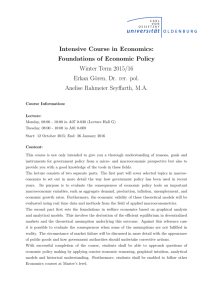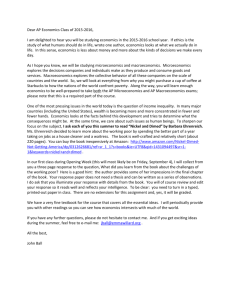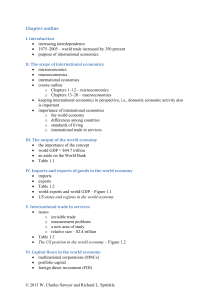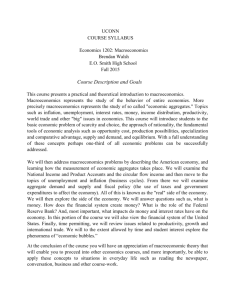ECO 3203, Waldo – Intermediate Macroeconomics
advertisement
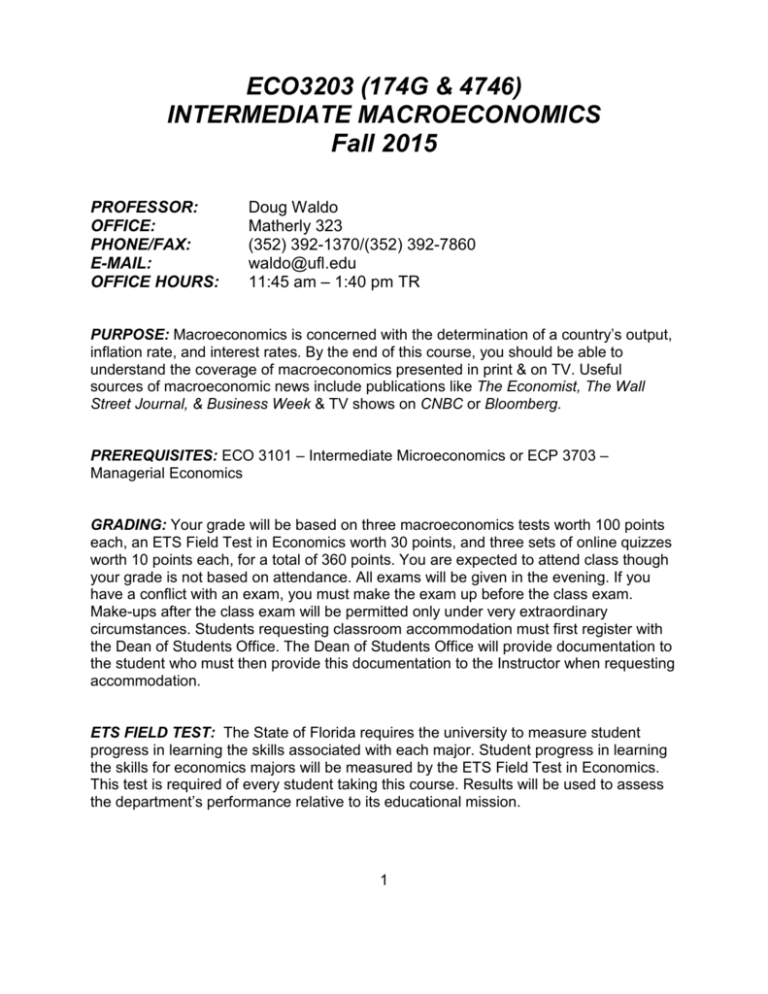
ECO3203 (174G & 4746) INTERMEDIATE MACROECONOMICS Fall 2015 PROFESSOR: OFFICE: PHONE/FAX: E-MAIL: OFFICE HOURS: Doug Waldo Matherly 323 (352) 392-1370/(352) 392-7860 waldo@ufl.edu 11:45 am – 1:40 pm TR PURPOSE: Macroeconomics is concerned with the determination of a country’s output, inflation rate, and interest rates. By the end of this course, you should be able to understand the coverage of macroeconomics presented in print & on TV. Useful sources of macroeconomic news include publications like The Economist, The Wall Street Journal, & Business Week & TV shows on CNBC or Bloomberg. PREREQUISITES: ECO 3101 – Intermediate Microeconomics or ECP 3703 – Managerial Economics GRADING: Your grade will be based on three macroeconomics tests worth 100 points each, an ETS Field Test in Economics worth 30 points, and three sets of online quizzes worth 10 points each, for a total of 360 points. You are expected to attend class though your grade is not based on attendance. All exams will be given in the evening. If you have a conflict with an exam, you must make the exam up before the class exam. Make-ups after the class exam will be permitted only under very extraordinary circumstances. Students requesting classroom accommodation must first register with the Dean of Students Office. The Dean of Students Office will provide documentation to the student who must then provide this documentation to the Instructor when requesting accommodation. ETS FIELD TEST: The State of Florida requires the university to measure student progress in learning the skills associated with each major. Student progress in learning the skills for economics majors will be measured by the ETS Field Test in Economics. This test is required of every student taking this course. Results will be used to assess the department’s performance relative to its educational mission. 1 ETS FIELD TEST (continued): The field test is designed to measure mastery of the concepts and material taught in Intermediate Microeconomics and the first part of Intermediate Macroeconomics. It consists of 90 multiple-choice questions covering microeconomics (37%), macroeconomics (35%), data analysis (15%), and other areas like International Economics, Public Economics, History of Thought, & Economic History (13%). Only correct answers are scored so you are not penalized for omissions or guesses. Sample questions can be found at http://www.ets.org/Media/Tests/MFT/pdf/mft_samp_questions_economics.pdf There is a fee for this test. If you have any questions about the exam or its implementation, please contact your instructor. COURSE MATERIALS: The three macroeconomics tests are based on lectures. Class notes are your most important resource. Note shells are available for this class & you should use them. Hard copies are available from Target Copy. Alternatively, you can download copies from Canvas. Lectures are based on Macroeconomics by N. Gregory Mankiw (ninth edition, ISBN-13: 978-1464182891). This book retails for $229.99. The publisher has a couple of other options available, but the electronic version will not be available until 10/15/2015. http://www.macmillanhighered.com/Catalog/product/macroeconomics-nintheditionmankiw/studentoptions#tab 2 TENTATIVE SCHEDULE: In the schedule that follows, the timing is approximate. Numbers in parentheses identify chapters from the book and the corresponding PowerPoint file. Week 1 2 3 4 5 6 7 8 9 10 11 12 13 14 15 16 Date 08/25 08/27 09/01 09/03 09/08 09/10 09/15 09/17 09/22 09/24 09/29 10/01 10/06 10/08 10/13 10/15 10/20 10/22 10/27 10/29 11/03 11/05 11/10 11/12 11/17 11/18 Wed 11/24 11/26 12/01 12/03 12/08 Topic Intro The Science of Macroeconomics (01) The Data of Macroeconomics (02) National Income (03) National Income (03) The Monetary System (04) Inflation (05) Unemployment & the Labor Market (07) Catch Up Midterm 1 over Chapters 1 - 7, at night ????? Growth I (08) Growth I (08) Growth II (09) Growth II (09) Fluctuations (10) IS/LM I (11) IS/LM 2 (12) The Open Economy (13) Aggregate Supply (14) Out of town, no class Midterm 2 over Chapters 8 – 13, at night ???? Dynamics (15) Consumption (16) Investment and the Stock Market (17) Alternative Perspectives on Stabilization (18) ETS Field Test given on a Wednesday night?????? Government Debt & Budget Deficits (19) Thanksgiving – No Class The Financial System (20) Epilogue (21) & Catch Up Midterm 3 over Chapters 14 – 21, at night????? 3 SKIP LIST: Some material in Mankiw can be skipped and is indicated in the table below. Unless otherwise indicated, skip all chapter appendices. Section in Mankiw 5.4 6.1 – 6.4 8.2 9.1 – 9.5 10.3 13.1 – 13.7 Topic The Nominal Interest Rate and the Demand for Money The Open Economy, skip the entire chapter The Golden Rule Level of Capital Economic Growth II, skip the entire chapter except the Appendix: Accounting for Sources of Economic Growth Aggregate Demand The Open Economy Again, skip the entire chapter 15.4 Two Applications: Lessons for Monetary Policy 16.5 Robert Hall and the Random-Walk Hypothesis 17 19.2 Investment, skip the entire chapter Problems in Measurement 4 WEBSITES: There are several useful websites that you may want to access. The Economist is the premier international business news weekly; many articles are free to the general public. http://www.economist.com/ If the article you want is not free; you can access it through the UF library databases. EIU Viewswire provides current business intelligence on 203 countries and can be accessed through the UF library databases. This site has articles describing economic and political trends; it also has a “Data tool” you can use to get data. UF Library Databases – these can be accessed directly from any computer logged on to the UF network. Go to the Smathers library site http://www.uflib.ufl.edu/ and from the yellow tabs at the top, select “Databases”. Enter “EIU Viewswire” or “Economist” or some other database identifier. Alternatively if you are not on campus, find and select the green tab on the left “Off-Campus Access” for proxy server or VPN access. Commanding Heights – website for the PBS miniseries. You can watch the entire show (small format) over the internet. However a better alternative is to go to Smathers library and check out the DVD which is on 24 hour reserve. http://www.pbs.org/wgbh/commandingheights/hi/index.html FRED II – data base for US macroeconomic data provided by the Federal Reserve bank of Saint Louis http://research.stlouisfed.org/fred2/ Greg Mankiw’s Blog is an interesting blog with comments on current issues http://gregmankiw.blogspot.com/ IMPLIED ACKNOWLEDGEMENTS: Enrollment in this course constitutes acknowledgement of the following: 1) I understand that the University of Florida expects its students to be honest in all of their academic work. I agree to adhere to this commitment to academic honesty and understand that my failure to comply with this commitment may result in disciplinary action, up to and including expulsion from the University. 2) I will adhere to university copyright policies as found at: http://www.uflib.ufl.edu/admin/Copyright.htm. 5 ACADEMIC LEARNING COMPACT: The State of Florida requires an Academic Learning Compact (ALC) for every undergraduate major. These ALC’s describe the skills students will acquire in the major and a means of measuring student progress in learning those skills. The ALC for Economics majors through the College of Liberal Arts and Science can be found at http://www.registrar.ufl.edu/catalog/programs/majors/alc/econclas.html The ALC for Economics majors through the Warrington College of Business can be found at http://www.registrar.ufl.edu/catalog/programs/majors/alc/economics.html This course helps students acquire the following skills that are part of both majors: • • • • • Understand how the implications of decisions made by households, firms, the government and the foreign sector affect a country's macroeconomic variables like output, interest rates, inflation, exchange rates and the trade balance. Understand how economists use statistics to learn about economic behavior. Critically evaluate and compare alternative policies using complex criteria. Interpret, understand and communicate quantitative concepts. Articulate ideas clearly and effectively in speech and in writing, in an accepted manner of presentation. ASSURANCE OF LEARNING: The Association to Advance Collegiate Schools of Business (AACSB) has a similar requirement for accredited schools of business. To maintain accreditation, schools of business must develop a set of learning goals and objectives that is consistent with the mission of the school. This course helps Warrington College of Business students achieve the following learning goals and objectives: Goal 1: Demonstrate competency in and across business disciplines Objective I: Demonstrate knowledge and understanding of elements of economics, finance, accounting, marketing, operations management, organizational behavior, business law, information technology, and business statistics. Objective II: Apply knowledge of business concepts in decisionmaking. 6 ASSURANCE OF LEARNING (Continued): Goal 2: Apply appropriate problem solving and decision-making skills Objective I: Specify and implement a framework for identifying a business problem. Objective II: Develop alternative solutions and a set of criteria by which to evaluate them. Objective III: Assess the outcomes of a course of action and make appropriate adjustments. Goal 3: Possess effective communication skills Objective I: Write business documents clearly, concisely, and analytically. Objective II: Speak in groups and in public clearly, concisely, and analytically, with appropriate use of visual aids. Goal 4: Appreciate the ethical and legal aspects of business Objective I: Define and explain the legal, ethical, and social responsibilities of business organizations. Objective II: Identify relevant ethical and social issues, particularly those that may not be obvious in complex business decisions. Goal 5: Possess a global perspective on business Objective I: Describe the key components of the business environment that vary across countries and understand how these differences present challenges/opportunities for the conduct of business. 7


